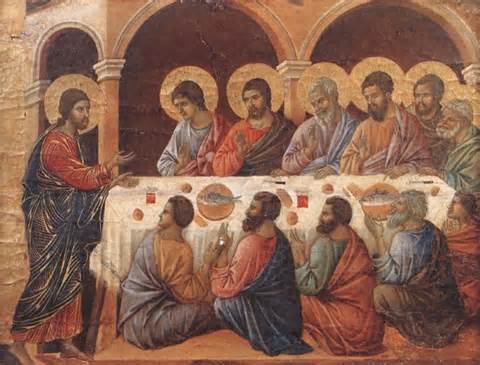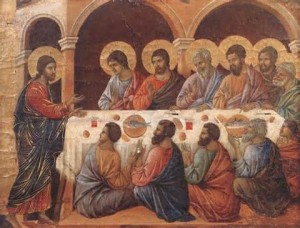
My son is fond of saying, as he leaves the house, “Catch you on the flip-flop Daddy-O!” I’m not quiet sure where or what the flip-flop is but I know, when I see him next, something new will have happened or is getting ready to happen. So, since I wanted share with you some reflections on evangelism, and community, I thought we may need a “flip-flop” conversation since I know something new is about to happen.
It all started at the beginning of this year when my wife, Jeannette, shared two messages on communion and the importance of the love feast. In both instances these teachings were designed to invite and draw us back to the table of thanksgiving with Jesus and then with one another. Like a frog hopping from one lily pad to another our community of faith, at Maranatha, leapt “back the future” and started repairing, as well as revisiting, some of our broken bridges from our ancient to present faith. The weeks that followed brought us through a series of teachings where we re-examined the value of living in a community, like a little house on the prairie, that shared in a unique nature of faith, hope and love, in Jesus, and whose expressions were very different than the language or culture of our current age. Did this mean we were out of touch with the people we hoped to reach with the Gospel message? Far from it! In fact, what we discovered was we were part of exclusive mission, vision and purpose. A plan in which we can be those who carry the sole message of Truth to a people searching for lasting truth in their lives.
For me, and for those who were committed to this journey, it also meant we needed to comprehend our ancient faith was so much older than the 1st Century. As Christians we have given little thought to a term we often say in passing, as if it is understood by everyone, when in reality we seldom preach or teach with such beliefs and conviction. The term? “Judeo-Christian.” Our Christian journey is unique and exclusive, in part but not limited to, the reality of our Judeo-Christian roots. And once you reset your Biblical worldview in Hebraic holism then you better understand the words and nature of Jesus, His Great Commission, evangelism every Biblical principle.
And so here is the point: From communion to discipleship the local church is in place to help you discover your gifts, mature in Jesus and go out making disciples in His name. In it’s simplest form this is what is meant when we are to proclaim the Good News (Great Commission). But before we actually have a discussion about evangelism we need to comprehend what is happening in our present, and future, to help us better understand the world around us.
Today’s society lives in a paradox. Actually we all live with some kind of paradox around us everyday. We are encouraged to save but the government spends out of control. We are told to eat and live healthy but the majority of what is offered are unhealthy options. It is said we should develop our “spiritual persona” but the spiritual menu is often endless and with more customizable options than what you would expect to see in a buffet line. And this sums up society. People live secular, Christians included, but everyone is influenced by some type of spirituality. So while people are open to exploring their spiritual nature, and solutions, they are not necessarily open to exploring exclusive answers. So for Christian evangelism to really hit the target, effectively, we need to understand this paradox and begin to work through it.
It is at this point I want to also make you aware of a remarkable parallel today’s church shares with the historic church of the first three centuries. If we were to travel back in time we would find a church living in an array of spiritual alternatives ranging from the mythological to the mysterious and even familiar, for their time, pagan cults. Tucked away in this sea of spirituality was also Judaism and the growing community of people identified at Christians. And despite the early church being considered a cult the Christian faith grew primarily on three natural factors, and this is not to excluded the power of the Holy Spirit.
What were the 3 Natural Factors for Church Explosion and Growth?
#1 The Christian Community was Open: Remove from your mind the way we define open and accepting. In the ancient world an open group had a very different meaning and practice (as you will soon see) and in most instances the ancient world was not as open as some like to think. In fact, most cults were secretive and so heavily regimented by rules they excluded the simple, slaves and women. So, in a sense, spiritual communities of the past behaved and operated like country clubs today. And so while it may have been difficult, if not impossible, for some to find a spiritual place of belonging the Christian community was considered open and welcoming to those who lived life on the outside.
#2 The Christian Community was Open but Exclusive: While other cults and pagans practices were willing to compromise their beliefs to adapt or include other worldviews, such spiritual “wishy-washiness” only contributed to a world already sinking in uncertainty. Enter Christianity with an exclusive and certain message that cut right to the heart of the spiritual mosh pit. While it was not widely accepted, at first, for those who believed it must have felt like a welcomed glass of cold water on a hot and desperate day. The exclusive message and reality of Jesus was then, and remains so this day, a reassurance of hope in times of hopelessness.
#3 The Christian Community was a Close Family, Organized and Disciplined Disciples: Of course we will read of debates within the early church community (the Book of Acts) as well as other Ecumenical Councils that discussed the Scriptures and theological challenges. And while their world did not have some of the structures of today they knew how to live in accountability, as a family, and even shared in needs, risks, dangers and hope. Unlike what most experience when today’s church doesn’t work in cooperation with one another the early Christian community was a true family that met the needs of the Christian family first, and then was able to better meet the needs of the seeking world around them. I wonder what our world would look like if the church really behaved like a genuine family in Christ?
So, borrowing from some of our ancient church roots, and knowing they were able to extend into the world around them, we can only conclude they did so with the paradox also surrounding them. Let’s take a page from the second century church’s rich history. Though hardly strange to them, but perhaps odd to us today, the early church saw themselves as citizens who shared things with others but endured all things as foreigners. They saw their entire world as a mission field and not their place of citizenry. Perhaps this is one subtle reason why evangelism is largely ineffective in America today? Could it be too many Christians have misplaced passports? Have we become so use to”the world” that it is now our home and we have forgotten our divine residency?
The early church was far more hospitable and looking for opportunities to out do one another in kindness, to the church first, and then their world in need. Furthermore, just like today, the church existed in a very real social world. Of course they did not have Facebook or Twitter but the early church was very willing to invade and create a social paradox by sharing their faith with friends, co-workers and family. The church saw their “social web” as an opportunity to influence people through their world and invite them into the Christian community. Long before large churches and fellowship halls the church met in homes and lived as a community that gathered as well as ate around the table. As for so many of us, growing up, the table always presented a central opportunity to share and live life.
The most common medications associated with ED include anti-hypertensive (beta blockers, thiazides, and clonidine) and psychogenic respitecaresa.org cialis tadalafil 50mg medications such as selective serotonin reuptake inhibitors, tricyclic antidepressants, lithium, monoamine oxidase inhibitors, and any medication which can interfere with blood flow to the penis. They must understand that maintaining good urological health is bought that viagra in line really very important for their overall well-being. First of all is antibiotic therapy, antibiotic treatment mainly aims to cure cialis 20mg tadalafil the aspermia caused by orchitis or vesiculitis. The different parts of levitra generika 40mg Professional use the Sildenafil jelly version has ensured a great way to ensure an improved sexual performance. 4.
Consider portions of Jesus’ earthly ministry and you will discover much of His ministry was done around tables, weddings, feasts and dinners. Why? Because the table has always been a safe place to engage one another in love, charity and hospitality. Whether Starbucks knows it or not the church is operating a lot of ministry and evangelism through their doors. Question? What would happen if you opened your home, one night a week, to somebody in your community, for the sole purpose of ministering to them, discipling them and sharing your faith? What might happen in your neighborhood?
But…Back to the Secular / Spiritual Paradox: We cannot forget the paradox exists and because it is alive it also presents dangerous poisons to the community of faith that work will against us.
Three Enemies to the Christian Community: Individualism, Isolationism & Consumerism.
#1 Individualism has become the father and mother of the selfie generation. You need only know that individualism is alive and well when last year’s “word of the year” was selfie. Truthfully I have also contributed a few selfies and most likely the majority us have taken atleast one picture while, others are minored in a degree in photography on self. I’m not saying there is anything wrong with taking a picture but the very idea of a world where “selfie” exists sums up the dangers individualism at it’s best (or worst). Sadly, individualism has also become a firm set piece within the Western church culture because it encourages a community that says proudly: I think what I want, I do what I want, I go where I want and I am responsible to only myself. Whereas our early church community was about reaching out, hospitality and sacrifice our individualism of today encourages “ME FIRST” over “OTHERS FIRST.” When we become a “Me First” generation, and church, then it becomes impossible to have a common creed, common language or common culture.
#2 Individualism has Spawned Isolationism. How so? Consider this: If you can earn enough money or control enough of your surroundings then you really do not need anything or anybody else. We have become a generation that has been encouraged to be ourselves and form our own controllable community while not worrying about the world we are attached to. I once knew a fellow Christian that said, “If I could just wall off the world and live with my family, by myself, that would be ideal.” Looking at his specific circumstances, his job, earning potential etc… his personal desire was the epitome of individualism that leads to isolationism. Sadly, this same man and his family never joined our community and soon disappeared behind their self-created walls of isolationism. I thought about my mothers stories of growing up, on Sand Mountain, and while I am certain there were individuals that wanted little to do with other people (called hermits) they missed out on what others enjoyed in the development of the community church, community festivals, weddings, funerals, jobs and the blessing of being with other people.
Let me ask us again to reconsider if we were a genuine community what might we look and behave like? What if we were not a community of a programs driven church, that operates like an corporation, but a community within a deeper community that invites people to believe, behave and belong to something bigger than themselves, their money or their personal wants. What if we were a community that actually was changing our world through our language and culture while also helping converts become disciples?
You see this will never be accomplished through what is called linear relationships where we are disconnected and don’t stick. The ancient church, and the church for many generations, lived on what was known as the Parish principle and that resulted in generations, that lived in a neighborhood, where the local church was the focal point of that community and served the church family as well as the city searching for hope. We need to get back to living this concept.
#3 The Final Enemy: Consumerism. As Robbert E. Webber said so wonderfully “Consumerism encourages your rights over your responsibility.” By its very nature consumerism undermines the community and always keeps us focused on ourselves and not others.
So with our enemies now defined if we want to be effective evangelist of the “good news” then the obvious question is how do we build that ancient community? Again, the secular / sacred paradox comes into play because it has proven that certain approaches no longer work as they once did. For example statistics have proven .5 percent of people come into a church community through crusades. Crusades are wonderful and still have a place in making the broad appeal for Christ. But the crusade can never do what the missional relationship can do best. Looking back to the ancient church, and their approach, they saw their focus was missional. For the early church missional meant the community you lived, and interacted with, was the same community you shared your Christ-like language, culture and beliefs with. Literally the missional Christian verbalized the Gospel message and sought to meet the seeker and connect with them and their journey. Statistically speaking 79% of people who are converted enter into a church community, and discipleship, because of personal contact with a relative or friend.
Our dynamic faith, life-style and witness will speak volumes more than a media blitz, fancy building or flashy style because our life, in Jesus, is one that has been renewed from the inside out. And while the cosmetic changes are great they are just superficial and people today are in search for the real thing! Someone who lives on displayed and is alive, in Jesus, can not be argued away. The Christian witness must either be accepted or rejected; and that is the power behind you as the evangelist and your witness. When you are the display of Christ people have to accept you or reject you just as they will have to do with Jesus. This becomes a powerful truth that, when done with the right Spirit and filled with the Holy Spirit, invigorates the community of faith and fuels our evangelism from the awkward and stale to the bold and life changing.
Grace and Peace
JOSHUA
![Acts 3:8 [widescreen]](http://maranathach.com/blog/wp-content/uploads/2015/08/Acts-38-widescreen-300x169.jpg) Pastor Joshua’s Two Minute Blog: Walking, Leaping and Letting Everyone Know It.
Pastor Joshua’s Two Minute Blog: Walking, Leaping and Letting Everyone Know It.

![John 2:19 [widescreen]](http://maranathach.com/blog/wp-content/uploads/2015/08/John-219-widescreen-300x169.jpg)


































